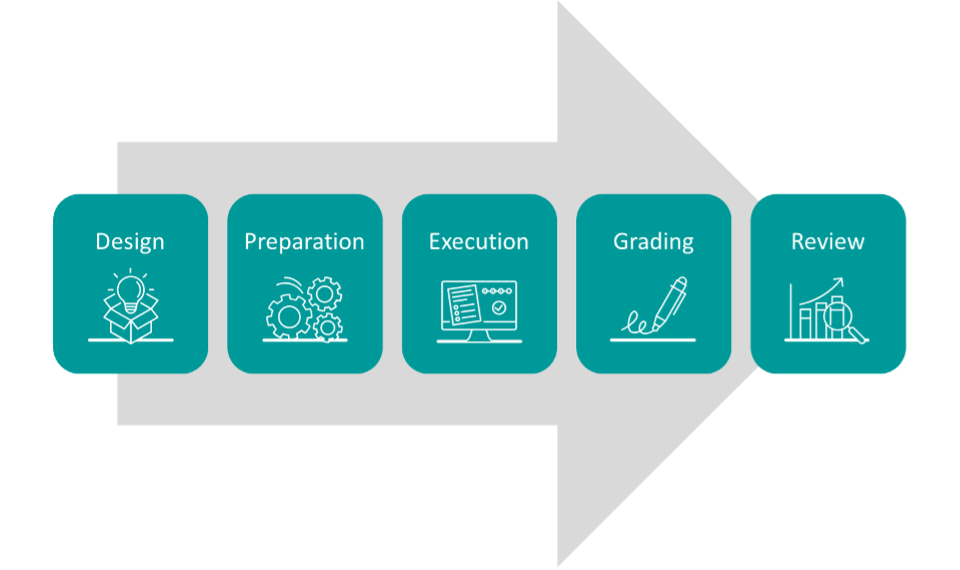Navigation auf uzh.ch
Navigation auf uzh.ch
The assessment lifecycle comprises five distinct phases, each offering unique opportunities for AI assistance to enhance efficiency and effectiveness. While our project primarily focuses on the grading phase, understanding the complete lifecycle is crucial for contextualizing AI's role in assessment. Throughout all phases, AI assistance must be implemented thoughtfully, with careful consideration of educational objectives, fairness, and the maintenance of human judgment in critical decisions.

Assessment design establishes the strategic foundation of the examination process. During this phase, instructors align learning objectives with assessment methods through constructive alignment principles. Key decisions include assessment format selection, delivery mode choice (digital vs. paper-based), and resource planning.
AI can support this phase by analyzing learning objectives and suggesting appropriate question formats, validating assessment structure for consistency with course goals, and ensuring comprehensive coverage of course material. These capabilities help instructors create more effective and balanced assessments.
The preparation phase involves creating the actual assessment materials and establishing grading criteria. This includes designing specific questions, developing comprehensive rubrics, and handling administrative preparations such as assessment personalization and logistics planning.
AI assistance during preparation enhances quality and consistency through several mechanisms. Advanced algorithms can generate questions aligned with specific learning objectives while estimating difficulty levels to ensure balanced assessments. The technology can also assist in creating example solutions and support the development of comprehensive rubrics, streamlining the preparation process while maintaining high standards.
During execution, students complete their assessments in various settings – from traditional lecture halls to online environments. This phase focuses on maintaining academic integrity and ensuring fair assessment conditions for all participants.
AI support during execution encompasses several critical functions. In online settings, AI systems can provide real-time monitoring and detect potential academic misconduct. The technology also enables automated technical support and environmental condition monitoring, ensuring a fair and stable assessment environment for all participants.
Grading represents the most time-consuming and cognitively demanding phase of the assessment lifecycle, particularly for open-ended questions. Our research and interviews consistently identified this phase as the primary challenge for educators, especially in team-based grading scenarios for large exams.
AI can significantly enhance the grading process through several sophisticated approaches. For efficiency enhancement, the technology enables automated preliminary scoring with human verification, while implementing similarity-based answer ordering to reduce cognitive load. In technical subjects, mathematical expression parsing capabilities streamline the evaluation process, and intelligent workload distribution systems optimize team-based grading scenarios.
Quality assurance in grading benefits from AI through adaptive rubric application based on answer patterns and sophisticated consistency checking across multiple graders. The system can detect potential grading discrepancies through outlier analysis and generate automated feedback, maintaining high standards across large assessment sets.
Process management in grading becomes more streamlined with AI assistance. The technology facilitates team coordination in collaborative grading scenarios while providing comprehensive progress tracking and workflow optimization. Statistical analysis enables robust quality control, and automation simplifies documentation processes, reducing administrative burden.
The key challenge lies in balancing AI capabilities with human judgment, ensuring that technology enhances rather than replaces expert assessment. Our interviews revealed strong support for AI assistance in grading, provided that human oversight remains central to the process.
The review phase enables students to understand their performance and learn from the assessment experience. This final stage is crucial for both immediate feedback and long-term learning outcomes.
AI enhances the review process through sophisticated analysis and personalization capabilities. The technology generates tailored learning recommendations while identifying common misconceptions across student cohorts. Through pattern analysis, it enables targeted interventions and facilitates the creation of individualized study plans based on assessment results.